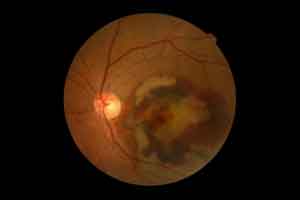- Home
- Editorial
- News
- Practice Guidelines
- Anesthesiology Guidelines
- Cancer Guidelines
- Cardiac Sciences Guidelines
- Critical Care Guidelines
- Dentistry Guidelines
- Dermatology Guidelines
- Diabetes and Endo Guidelines
- Diagnostics Guidelines
- ENT Guidelines
- Featured Practice Guidelines
- Gastroenterology Guidelines
- Geriatrics Guidelines
- Medicine Guidelines
- Nephrology Guidelines
- Neurosciences Guidelines
- Obs and Gynae Guidelines
- Ophthalmology Guidelines
- Orthopaedics Guidelines
- Paediatrics Guidelines
- Psychiatry Guidelines
- Pulmonology Guidelines
- Radiology Guidelines
- Surgery Guidelines
- Urology Guidelines
Retinal disease- leading cause of chronic blindness

The blind population in India is estimated to rise to 15 million by 2020. Retinal diseases account for a significant share of the vision loss burden, compared to other eye-related diseases that can cause blindness.
Of the various retinal disorders, age-related macular degeneration (AMD) and diabetic macular edema (DME) are two progressive diseases that cause loss of vision. AMD and DME can be effectively managed if patients are diagnosed in a timely manner.
Therefore, it is important to understand the underlying symptoms associated with the diseases to identify the disease at an early stage.
-Understanding Age-related Macular Degeneration (AMD) and Diabetic Macular Edema (DME)
The retina is that part of the eye where the final vision is formed, the way it is created on a film inside a camera. If the retina is damaged, the vision is automatically affected.
AMD affects the macula of the retina causing damage to the central vision. AMD is one of the important causes of severe visual loss in the elderly population. It constitutes 8.7% of blindness in the world.
Diabetic Retinopathy damages blood vessels inside the retina at the back of the eye. It constitutes 4.8% of blindness in the world. Diabetic Retinopathy leads to Diabetic Macular Edema (DME) which is the most common form of DR. It occurs when the damaged blood vessels swell and leak into the macula of the retina causing visibility problem in the normal vision.
-Awareness of Retinal Diseases
Dr. Ajay Dudani, Ophthalmologist and Eye and Vitreoretinal Surgeon, Bombay Hospital & CEO of Mumbai Retina Centre said, "The severity of Diabetic Retinopathy is related to the duration of Diabetes Mellitus (DM). A person suffering from DM for a period of 10 years has 50% risk of getting diagnosed with Diabetic Retinopathy whereas if the duration increases to 20 years the rate ratchets up to 90%. Similarly, poor diabetes control leads to rapid progression of DR."
-Timely diagnosis
Dr. Raja Narayanan, Secretary of VRSI & Head of Clinical Research, L.V. Prasad Eye Institute, Hyderabad, said, "Retinal diseases like age-related macular degeneration and diabetic macular edema are progressive conditions that can be managed effectively if diagnosed in a timely manner. Therefore, it is vital to seek expert advice as soon as one experiences the symptoms. Timely diagnosis can help slow the disease progression."
Patients need to be alert in recognizing early signs and symptoms of retinal diseases. Most often, the symptoms of AMD are confused with old age. Diabetics are advised to visit an ophthalmologist/retinologist every six months, as they are at a higher risk of developing diabetic retinopathy. Early detection of AMD and DME increases the possibility of preventing vision loss.
-Common signs and symptoms
The symptoms of retinal diseases may vary depending on the type of retinal disorder. However, most of the symptoms overlap each other or are common in various diseases. For example:
• blurred or fuzzy or distorted vision
• impaired color vision
• decreased contrast or color sensitivity
• experiencing dark spots in vision
• straight lines that appear wavy or crooked
• difficulty seeing at a distance
• vision loss
-Treatment Protocol
Today, there are treatments available that can slow or halt disease progression. Some of the treatment options available in India include laser photocoagulation, anti-VEGF (Vascular Endothelial Growth Factor) injections and combination therapy which includes laser and anti-VEGF treatment

Disclaimer: This site is primarily intended for healthcare professionals. Any content/information on this website does not replace the advice of medical and/or health professionals and should not be construed as medical/diagnostic advice/endorsement or prescription. Use of this site is subject to our terms of use, privacy policy, advertisement policy. © 2020 Minerva Medical Treatment Pvt Ltd